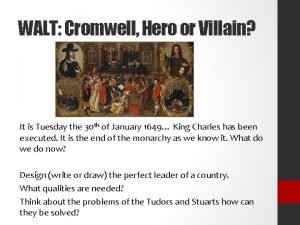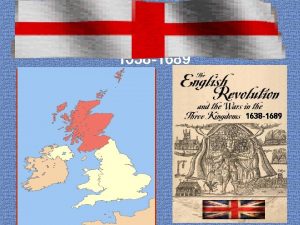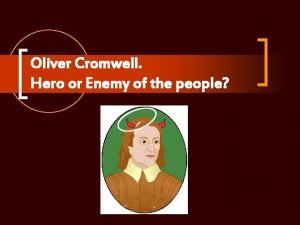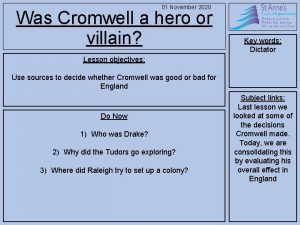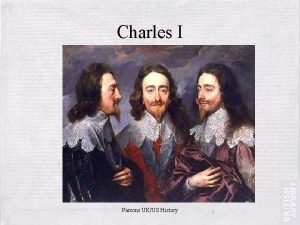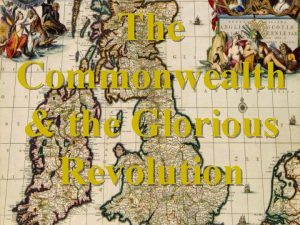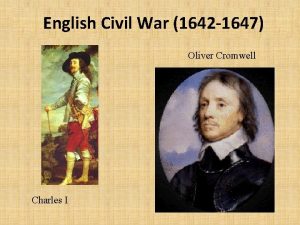History Lesson 5 of 6 Oliver Cromwell Enquiry







- Slides: 7

History - Lesson 5 of 6 Oliver Cromwell Enquiry: In what ways was Britain turned upside down in the seventeenth century? Mr Olivey 1

Cromwell’s rise to power Oliver Cromwell (1599 - 1658) turned Britain upside-down in the 1640 s and 1650 s. He held strict Puritan beliefs throughout his life; these beliefs shaped all his political decisions. The popularity of Cromwell’s radical ideas saw him elected to Parliament in 1628 and 1640. Yet it was during the English Civil War that Cromwell became the most powerful man in England. Cromwell’s leadership saw the Parliament’s New Model Army triumph over Charles’s Royalist forces in 1646 and again in 1648. When Cromwell became Lieutenant General in 1647, he took control of a fearsome fighting force.

Ireland Scotland After Charles I was executed in January 1650, Cromwell turned his attentions to Ireland. Years earlier, Cromwell had been told (potentially false) rumours about Catholic atrocities. Cromwell’s forces clubbed unarmed Catholic priests and some civilians to death in the town of Drogheda. They also massacred thousands of Irish Catholics in Wexford. Cromwell’s next target was Scotland. Here, Charles I’s son (who was also called Charles) was attempting to restart the Civil Wars. In less than a year, Charles fled to France and Scottish resistance was crushed. By September 1651, Cromwell controlled all of the British Isles.

Problems with Parliament When Cromwell returned to London in 1651, he hoped that the remaining MPs in the ‘Rump Parliament’ would act in a Godly manner. They did not. By 1653, Cromwell lost patience and marched into parliament and dissolved it. The Rump’s replacement - the ‘Parliament of Saints’ - did not last long; when Cromwell dismissed these MPs after a few months, he lectured them about God for four hours. Despite claims that he acted like a king, Cromwell was never crowned. Instead, during the Interregnum, England was a republic (a country without a king or queen). Cromwell’s title was Lord Protector.

Cromwell’s legacy Cromwell wanted ‘Godly government’. His Puritan followers banned football, partying and Christmas - but England’s experiment with republicanism only lasted eleven years. Today, Cromwell’s legacy remains complicated and contested. His forces killed thousands of innocent Catholics in Ireland. In parts of the Republic of Ireland today, Cromwell is remembered as ‘The Butcher of Drogheda’ because of these brutal massacres. Yet in the 1800 s, Victorian historians overlooked this violence and admired Cromwell for ‘rescuing’ England from the tyranny of Charles I.

Glossary Atrocity - an extremely cruel act of violence and terror. Puritan - a very strict group of Christians who wanted to simplify worship. Elected - when someone wins the most votes in an election for a role. Massacred - the deliberate, brutal killing of a large number of people. Resistance - refusing to do, believe or say something. Dissolved - to close down or dismiss something. Interregnum - a period when England was ruled without a king from 1649 -60. Legacy - what is left behind by someone or something that came before.

Comprehension Questions 1. When did Cromwell become the most powerful man in England? 1. What did Cromwell’s forces do in Ireland in 1650? 1. What did Cromwell do when he dismissed the ‘Parliament of Saints’ in 1653? 1. What was the Interregnum? 1. How has Cromwell been remembered since the 1650 s?
